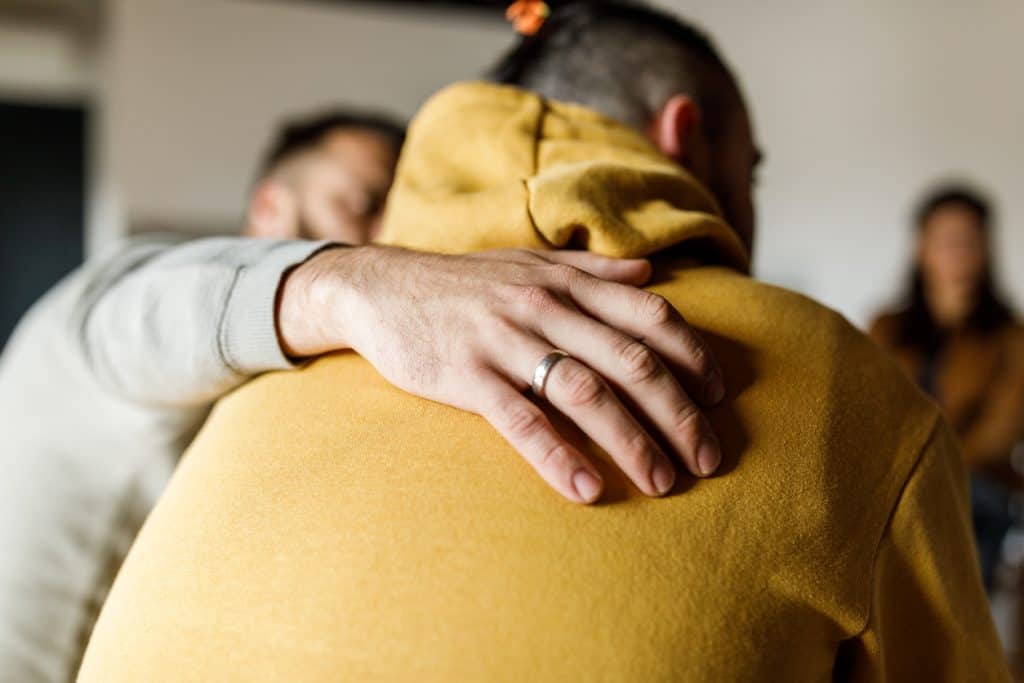Right now our culture seems to be obsessed with identifying ourselves by our genitalia, sexuality, political views, and skin color. Of course, these can be important pieces to a person’s identity, but they are only pieces. If we really want to understand who we are as individuals and as a society, we need a much bigger picture of what it means to have an identity.
Who are you really? What even makes a person who they are? Is identity defined by our physical bodies—even by our style of haircut? Is it defined by our beliefs? Are we defined by our tribes or the type of culture we subscribe to? By our family? By who we listen to on YouTube?
If you are a Christian, you know the “right” answer. Our identity is found in Christ alone. And you would be right! “For you have died, and your life is hidden with Christ in God” (Colossians 3). Indeed, Christ IS your life! But I find myself asking, what does this actually mean practically? What about in the context of pornography? If I am in Christ and am a new creation, and if I read my Bible and pray and go to church, how do I end up back on porn? Well, there are a few ways to answer this. One is sin. Another is trauma. And another is an incomplete identity.
None of these answers are excuses. They are explanations. Our flesh loves sin. No wonder, because it feels great, but the passions of the flesh wage war on our soul (1 Peter 2). Most of us who look at porn have some form of trauma in our past and have found that porn is a temporary relief for it. Trauma is not a license to look at porn; it’s an explanation for why we do it. An explanation helps us understand our experience, but you don’t just want to understand, you want it to stop.
This is where identity comes in. You can’t just stop porn. That is not how the brain works. If I told you not to think about a pink elephant right now, you wouldn’t be able to do it. Your brain can’t just not do something, it needs something else to do instead. And so again I ask, who are you really? Who do you want to be? If you don’t want to be the guy with pornographic images constantly flashing through his mind, then what would you rather be thinking about?
Seven Spheres of Relational Identity
I’ve found it helpful to think about personal identity in terms of relationships. We all have relationships whether we realize it or not, and I’ve broken them down into seven spheres of relational identity: self, family, spiritual, social, romantic, work, and civil. All of these spheres have some level of overlap as they have an influence on one another. None of these spheres exist entirely on their own since they are embodied by your whole identity as an individual. Each of these spheres makes up a part of who you are. And so I’d like to use the rest of this article to help you think through what it would look like to build out an identity for yourself in each of these seven areas.
A full identity helps us know our role (purpose), find our direction (goals), and experience motivation (significance). If you build this identity with intention, you will find that the problem of porn becomes insignificant. Focus on what’s important to you, not what’s holding you back. The design of the rest of this article is to help you practically construct a vision for the identity you desire in each of the seven spheres.
You can take the time for now and briefly skim through the text to see roughly what is there, but the most helpful thing you can do is put some time aside and write down your answers to each of the questions. Maybe take fifteen minutes per sphere over the course of a week—one sphere per day—and see what you come up with. Your answers won’t be perfect, and they may surprise you. The questions will help you begin to think about what you actually want and who you actually want to be. My guess is that looking at pornography won’t fit anywhere in your desired identity.
The process of writing is an excellent way to help you slow down, think about what you believe, identify who you are, and decide how you want to operate in this life.
Self
Not everyone thinks about the fact that we have a relationship with ourselves. It’s even biblical! Psalm 42:11 says, “Why are you cast down, O my soul, and why are you in turmoil within me? Hope in God; for I shall again praise him, my salvation and my God.”
Did you ever think about which part of you is speaking to the other part of you? Interesting stuff!
What would you like your relationship with yourself to look like? When you have this dialogue with yourself, is there peace? Or is there turmoil? Or something else? What would you like this dialogue with yourself to look like? A certain tone? A certain time of day? Even if you had achieved the relationship with yourself that you so desire, how would you know you did, in fact, achieve it? What would you notice about yourself that would suggest to you that you made it there? What would others notice about you? When was the last time you felt this way? How did you get there?
Family
When you think about being the kind of family member you want to be, what are the top three values or qualities that come to mind? Think about a specific time when you felt you were the best version of yourself as a family member. What were you doing, and how did it make you and others feel? What is one small, practical step you can take to demonstrate the kind of family member you want to be in your daily interactions? Imagine your family members giving you positive feedback about the type of family member you aspire to become. What would they say, and how would it make you feel?
What strengths or resources do you possess that can help you embody the role you envision for yourself within your family? When faced with challenges or conflicts within your family, how might the family member you want to be respond in a constructive way? What is one way you can create meaningful connections and build stronger relationships with your family members?
Spiritual
What are the core beliefs or values from your Christian faith that resonate most strongly with you, and how do they influence your daily life? When you feel most connected to your Christian spirituality, what activities or practices are you engaged in, and how do they enrich your overall well-being?
Can you recall a time when your Christian faith provided you with guidance or comfort during a difficult period in your life? How did it impact your perspective and actions? When you envision living in alignment with your Christian spirituality, what changes or improvements do you see in your thoughts, behaviors, or relationships?
Social
What are some of your most cherished qualities or strengths that you bring to your social relationships? Think about a time when you felt genuinely connected and valued in your social circle. What specific actions or behaviors contributed to that positive experience? In your ideal social identity, how do you envision yourself contributing to the well-being and happiness of those around you? What is one small, meaningful gesture or act of kindness you can incorporate into your daily interactions to strengthen your social bonds?
Think of a challenge or conflict in a social relationship you have. How might your ideal self approach this situation? What would it mean to you to have friends that are striving for the same things you are or challenging and encouraging you to reach your goals?
Romantic
What are your top three strengths as a partner in a romantic relationship? Reflecting on your past positive romantic experiences, what were the key qualities and values that contributed to the success of those relationships? In envisioning your ideal romantic identity, how would you like to show love and affection to your partner? How do you see yourself expressing vulnerability and emotional intimacy?
Think about the times when communication was most effective and satisfying in your romantic relationship. What specific communication styles or techniques contributed to those positive interactions? How can you actively cultivate trust and emotional safety in your romantic relationship, creating an environment where both you and your partner can feel secure and supported? When faced with challenges or conflicts in your romantic relationship, how would your ideal romantic identity approach these situations with empathy and a focus on mutual growth?
If you are in a romantic relationship, what is one concrete step you can take to nurture your relationship, such as a date night, shared activities, or open conversations about each other’s needs and aspirations?
Work
What are the aspects of your current job or career that bring you the most joy and fulfillment? Think about a time when you successfully navigated a challenging work situation. What strategies did you use to find success? In your ideal work identity, how do you balance personal growth and professional development to be the type of worker you want to be? What kind of work environment or culture do you thrive in the most? How do you know? What are your long-term career aspirations? What is one action you can take now to move closer to your desired professional path?
How do you see yourself positively impacting the lives of others through your work, whether it’s colleagues, clients, or the community you serve? What is one small, meaningful change you can add to (or take away from) your daily routine or mindset to enhance your overall job satisfaction and well-being?
Civil
Civil identity can be expressed in various ways, such as community involvement, volunteering, voting, participating in public discourse, advocating for causes that align with your values, or simply being a good neighbor. What are some of the needs of the community you live in? In what ways are you equipped or gifted to contribute to addressing those needs? If you don’t know the needs, what is one way you can find out?
What is an example of someone else living out their civil life in a way you found honorable? What about it was inspiring to you? When you envision your ideal civil identity, how do you see yourself making a positive difference in your community or society at large? What are the top three traits you believe make someone a good neighbor? Or more broadly, an upstanding citizen? When are the moments you live into those qualities?
Conclusion
True freedom isn’t just freedom from porn. It’s the freedom to be who you are and who God made you to be, in every part of your life and in every relationship. You won’t be perfect or even good at living into your whole identity at the start, but you can take small steps and move toward realizing the life you’ve always wanted, and it can start today.








Each of these spheres makes up a part of who you are. And so I had like to use the rest of this article to help you think through what it would look like to build out an identity for yourself in each of these seven areas.